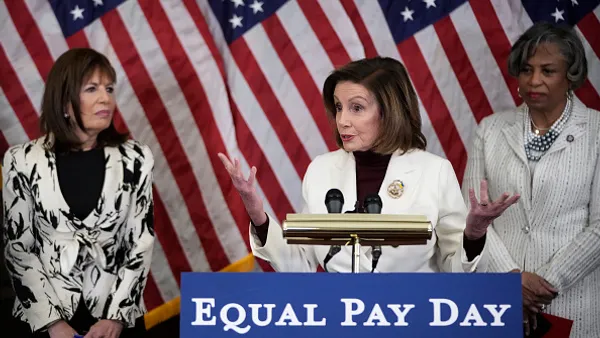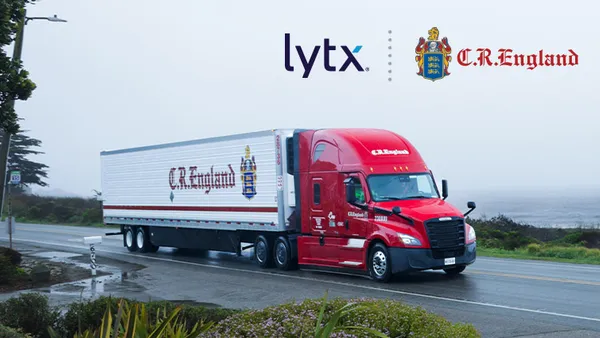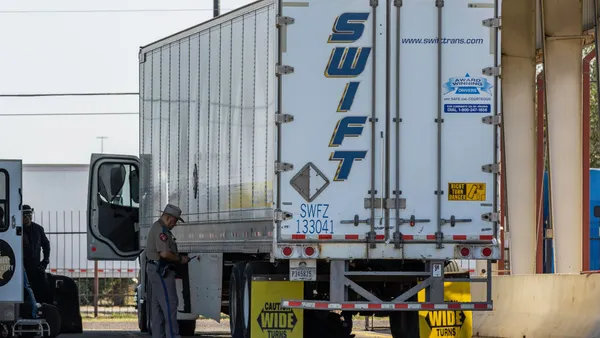The challenges keep coming in this pandemic-era supply chain, with drayage and dock congestion among the most daunting of late. These issues exacerbate longstanding labor constraints, as well as productivity.
Trucks are sitting in long lines waiting for their turn at the dock, in some cases tanking driver pay and overall business output. Companies are scrambling for solutions.
Hub Group, for example, began offering drivers incentives to boost productivity.
"We've put in new incentives to align [drivers'] behavior with our performance, whether it's safety or retention bonuses or night and weekend work, productivity pay — all those things, are going to be very beneficial in solving" network fluidity, COO Phil Yeager said in an earnings call at the end of July.
Costs associated with salaries and benefits did increase in Q3, primarily due to that incentive compensation, as well as commission expense, the company reported during its latest earnings call at the end of last month. But Hub Group is not alone in focusing on driver motivation to increase productivity.
Incentives for productivity
John Miller, managing partner at nationwide linehaul co-op Plains Dedicated, understands the allure of tying driver incentives to productivity. But he hesitates to approach it in that way only.
"My biggest concern if you tie driver pay to productivity is a lawsuit," he said. "It would be easy for a driver to claim that you forced them to do X, Y, or Z for pay, and that it's not fair."
With this concern in mind, Miller has changed the metrics for incentivizing drivers, still hoping to bolster productivity.
"We tie incentives to safety performance," Miller said. "If they take a certain number of safety classes, there's a bonus. Get a clear [Department of Transportation] report; receive a bonus."
"My biggest concern if you tie driver pay to productivity is a lawsuit."

John Miller
Managing Partner at Plains Dedicated
Additionally, Miller incentivize employees to think as a team. The company tells everyone it needs to make a profit before it can give bonuses, he said. And if the group works together toward that goal, all workers get a bonus.
Individuals also have the opportunity to score extra pay — fleet managers who ensure safety and productivity are eligible for a percentage of profits, for instance.
"If you've got a slow week and they're getting a percentage of revenue, they'll want to be more productive to make more money," Miller said.
Another approach is to create a bonus system for dispatchers, also with an eye on safety, which Miller has witnessed other companies try.
"The thinking is that a dispatcher doesn't want to lose more than one or two drivers per month because it will decrease their bonus," he said. "If accidents and other safety violations stay within range, the dispatchers get a kicker."
The market rules
Craig Zeller, founder and owner of 50-truck fleet Zeller Transportation in Wisconsin, is reluctant to pay drivers based on performance.
"This idea is one of my struggles," he said. "In many instances, the driver doesn't have control over a load. If a shipment takes three hours to load and two to unload, ultimately, it's operations who gave the driver that assignment, and it's not the driver's fault for being less productive."
As a result, Zeller does not factor in driver incentives to ROI and KPIs.
"We pay our drivers what the market dictates," he explained. "It doesn't matter how it fits into our sales."
It's not that Zeller hasn't considered linking percentages of revenue to bonuses — he has.
"My struggle is that when margins are thin and rates go down, it's not the driver's fault."

Craig Zeller
Founder and Owner of Zeller Transportation
"My struggle is that when margins are thin and rates go down, it's not the driver's fault," he said. "If we have a bonus program, then everyone is rewarded handsomely when the market is hot, like right now. But when things slow down, is it fair to cut pay?"
Ultimately, Zeller is gambling on his straightforward, even-keel approach to keep his drivers happy and therefore, sticking around.
"It's tough because everybody forgets yesterday," he said. "I'm fair and consistent, but that doesn't mean a driver won't walk into a truck stop, see a sign for higher wages, and leave."
From where Miller stands, companies need to change their models if they are to retain drivers and other staff, and increase productivity.
"Once you've given a raise, you can't take them back no matter how productive your drivers are," he said. "But if you give a percentage bonus tied to productivity, you get results."












